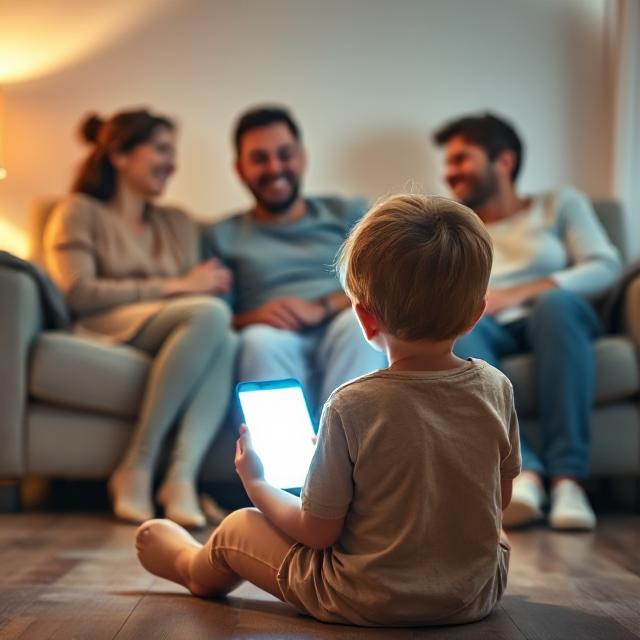في عصر أصبحت فيه التكنولوجيا جزءاً لا يتجزأ من حياتنا اليومية، بات من الصعب إبعاد أطفالنا عن الهواتف الذكية والأجهزة اللوحية. هذه الأجهزة التي نراها وسيلة للترفيه والتعلم، قد تتحول دون وعي منا إلى سيف ذي حدين، يهدد سلامة أطفالنا الجسدية والنفسية ونموهم الاجتماعي. فما هي المخاطر الحقيقية التي يحملها هذا العالم الرقمي لأجيالنا الصاعدة؟
أخطار جسدية لا يمكن تجاهلها
إن قضاء الأطفال ساعات طويلة أمام شاشات الهواتف الذكية يعرضهم لمجموعة من المشاكل الصحية المقلقة. يأتي في مقدمتها إجهاد العين الرقمي، حيث يؤدي التركيز المستمر في الشاشات الساطعة إلى جفاف العين، الصداع، وتشوش الرؤية على المدى الطويل. كما أن وضعية الانحناء الدائمة للنظر في الهاتف تسبب آلاماً في الرقبة والظهر، وهي الحالة التي باتت تُعرف بـ “متلازمة عنق النص” (Text Neck)، والتي قد تؤدي إلى مشاكل في العمود الفقري مستقبلاً.
ولا ننسى التأثير الخطير على جودة النوم، فالضوء الأزرق المنبعث من الشاشات يثبط إنتاج هرمون الميلاتونين المسؤول عن تنظيم دورات النوم، مما يجعل نوم الأطفال متقطعاً وغير مريح، ويؤثر سلباً على تركيزهم ونشاطهم خلال النهار.
تأثيرات نفسية واجتماعية عميقة
لا تقتصر الأضرار على الجانب الجسدي، بل تمتد لتطال الصحة النفسية والنمو الاجتماعي للأطفال. فقد أظهرت دراسات عديدة وجود صلة بين الاستخدام المفرط للهواتف الذكية وارتفاع معدلات القلق والاكتئاب بين الأطفال والمراهقين. فالعالم الافتراضي يخلق مقارنات اجتماعية غير واقعية، ويفتح الباب أمام التنمر الإلكتروني (Cyberbullying) الذي يترك ندوباً نفسية عميقة.
إن إدمان الهواتف الذكية يخلق نوعاً من العزلة الاجتماعية، حيث يفضل الطفل التفاعل مع عالمه الرقمي على اللعب والتواصل الحقيقي مع أقرانه وأفراد أسرته. هذا الأمر يعيق تطور مهاراته الاجتماعية الأساسية، مثل لغة الجسد، والتعاطف، والقدرة على حل النزاعات وجهاً لوجه.
مخاطر المحتوى غير اللائق وتأثيره على التطور المعرفي
يمنح الهاتف الذكي الطفل وصولاً غير محدود إلى عالم الإنترنت، بما يحمله من محتويات قد تكون غير مناسبة لأعمارهم، مثل المشاهد العنيفة أو المواد الإباحية، مما يؤثر على سلامتهم الفكرية والأخلاقية. علاوة على ذلك، فإن الاعتماد على الترفيه السريع والمحتوى القصير الذي تقدمه التطبيقات المختلفة يقلل من قدرة الطفل على التركيز والانتباه لفترات طويلة، وهو ما يؤثر سلباً على تحصيله الدراسي وقدرته على القراءة والتعلم العميق.
دورنا كآباء ومربين
المسؤولية تقع على عاتقنا لحماية أطفالنا من هذه المخاطar. من الضروري وضع قواعد واضحة وحازمة لاستخدام الهاتف الذكي، وتحديد أوقات معينة يُمنع فيها استخدامه، مثل أوقات الوجبات وقبل النوم. يجب علينا أيضاً مراقبة المحتوى الذي يتعرض له أطفالنا وتثقيفهم حول كيفية التصرف بأمان على الإنترنت.
والأهم من ذلك كله، هو تشجيعهم على الانخراط في أنشطة بديلة بعيداً عن الشاشات، مثل القراءة، وممارسة الرياضة، واللعب في الهواء الطلق، وقضاء وقت عائلي حقيقي يعزز الروابط ويصنع ذكريات لا يمكن لعالم افتراضي أن يحل محلها.
إن الهواتف الذكية أداة قوية، ولكنها تتطلب حكمة ومسؤولية في استخدامها. فلنحرص على أن تكون هذه الأداة نافذة لأطفالنا على المعرفة والإبداع، لا سجناً يعزلهم عن جمال الواقع ودفء العلاقات الإنسانية.
In an era where technology is an inseparable part of our daily lives, keeping our children away from smartphones and tablets has become increasingly difficult. These devices, which we often see as tools for entertainment and learning, can unwittingly become a double-edged sword, threatening our children’s physical, psychological, and social well-being. What are the real dangers that this digital world holds for our rising generation?
Physical Dangers That Cannot Be Ignored
Spending long hours in front of smartphone screens exposes children to a range of alarming health problems. At the forefront is digital eye strain, where constant focus on bright screens leads to dry eyes, headaches, and blurred vision in the long term. Furthermore, the persistent hunched-over posture while looking at a phone causes neck and back pain, a condition now known as “Text Neck,” which can lead to future spinal issues.
We must also consider the serious impact on sleep quality. The blue light emitted from screens suppresses the production of melatonin, the hormone responsible for regulating sleep cycles. This leads to intermittent and restless sleep for children, negatively affecting their concentration and energy levels during the day.
Profound Psychological and Social Impacts
The damage is not limited to the physical aspect; it extends to the mental and social development of children. Numerous studies have shown a link between excessive smartphone use and increased rates of anxiety and depression among children and adolescents. The virtual world creates unrealistic social comparisons and opens the door to cyberbullying, which leaves deep psychological scars.
Smartphone addiction fosters a form of social isolation, where a child prefers interacting with their digital world over playing and communicating in real life with peers and family members. This hinders the development of essential social skills, such as understanding body language, empathy, and the ability to resolve conflicts face-to-face.
The Risks of Inappropriate Content and its Effect on Cognitive Development
A smartphone gives a child unrestricted access to the internet, with all its potentially inappropriate content for their age, such as violent scenes or pornographic material, affecting their intellectual and moral safety. Moreover, reliance on the fast-paced entertainment and short-form content offered by various apps diminishes a child’s ability to focus and maintain attention for extended periods. This negatively impacts their academic performance and their capacity for deep reading and learning.
Our Role as Parents and Guardians
The responsibility lies with us to protect our children from these dangers. It is essential to establish clear and firm rules for smartphone use, designating specific times when it is prohibited, such as during meals and before bedtime. We must also monitor the content our children are exposed to and educate them on how to navigate the internet safely.
Most importantly, we should encourage them to engage in alternative activities away from screens, such as reading, playing sports, spending time outdoors, and having genuine family time that strengthens bonds and creates memories that no virtual world can replace.
Smartphones are powerful tools, but they require wisdom and responsibility in their use. Let us ensure that this tool serves as a window to knowledge and creativity for our children, not a prison that isolates them from the beauty of reality and the warmth of human connection.
أخطار جسدية لا يمكن تجاهلها
إن قضاء الأطفال ساعات طويلة أمام شاشات الهواتف الذكية يعرضهم لمجموعة من المشاكل الصحية المقلقة. يأتي في مقدمتها إجهاد العين الرقمي، حيث يؤدي التركيز المستمر في الشاشات الساطعة إلى جفاف العين، الصداع، وتشوش الرؤية على المدى الطويل. كما أن وضعية الانحناء الدائمة للنظر في الهاتف تسبب آلاماً في الرقبة والظهر، وهي الحالة التي باتت تُعرف بـ “متلازمة عنق النص” (Text Neck)، والتي قد تؤدي إلى مشاكل في العمود الفقري مستقبلاً.
ولا ننسى التأثير الخطير على جودة النوم، فالضوء الأزرق المنبعث من الشاشات يثبط إنتاج هرمون الميلاتونين المسؤول عن تنظيم دورات النوم، مما يجعل نوم الأطفال متقطعاً وغير مريح، ويؤثر سلباً على تركيزهم ونشاطهم خلال النهار.
تأثيرات نفسية واجتماعية عميقة
لا تقتصر الأضرار على الجانب الجسدي، بل تمتد لتطال الصحة النفسية والنمو الاجتماعي للأطفال. فقد أظهرت دراسات عديدة وجود صلة بين الاستخدام المفرط للهواتف الذكية وارتفاع معدلات القلق والاكتئاب بين الأطفال والمراهقين. فالعالم الافتراضي يخلق مقارنات اجتماعية غير واقعية، ويفتح الباب أمام التنمر الإلكتروني (Cyberbullying) الذي يترك ندوباً نفسية عميقة.
إن إدمان الهواتف الذكية يخلق نوعاً من العزلة الاجتماعية، حيث يفضل الطفل التفاعل مع عالمه الرقمي على اللعب والتواصل الحقيقي مع أقرانه وأفراد أسرته. هذا الأمر يعيق تطور مهاراته الاجتماعية الأساسية، مثل لغة الجسد، والتعاطف، والقدرة على حل النزاعات وجهاً لوجه.
مخاطر المحتوى غير اللائق وتأثيره على التطور المعرفي
يمنح الهاتف الذكي الطفل وصولاً غير محدود إلى عالم الإنترنت، بما يحمله من محتويات قد تكون غير مناسبة لأعمارهم، مثل المشاهد العنيفة أو المواد الإباحية، مما يؤثر على سلامتهم الفكرية والأخلاقية. علاوة على ذلك، فإن الاعتماد على الترفيه السريع والمحتوى القصير الذي تقدمه التطبيقات المختلفة يقلل من قدرة الطفل على التركيز والانتباه لفترات طويلة، وهو ما يؤثر سلباً على تحصيله الدراسي وقدرته على القراءة والتعلم العميق.
دورنا كآباء ومربين
المسؤولية تقع على عاتقنا لحماية أطفالنا من هذه المخاطar. من الضروري وضع قواعد واضحة وحازمة لاستخدام الهاتف الذكي، وتحديد أوقات معينة يُمنع فيها استخدامه، مثل أوقات الوجبات وقبل النوم. يجب علينا أيضاً مراقبة المحتوى الذي يتعرض له أطفالنا وتثقيفهم حول كيفية التصرف بأمان على الإنترنت.
والأهم من ذلك كله، هو تشجيعهم على الانخراط في أنشطة بديلة بعيداً عن الشاشات، مثل القراءة، وممارسة الرياضة، واللعب في الهواء الطلق، وقضاء وقت عائلي حقيقي يعزز الروابط ويصنع ذكريات لا يمكن لعالم افتراضي أن يحل محلها.
إن الهواتف الذكية أداة قوية، ولكنها تتطلب حكمة ومسؤولية في استخدامها. فلنحرص على أن تكون هذه الأداة نافذة لأطفالنا على المعرفة والإبداع، لا سجناً يعزلهم عن جمال الواقع ودفء العلاقات الإنسانية.
In an era where technology is an inseparable part of our daily lives, keeping our children away from smartphones and tablets has become increasingly difficult. These devices, which we often see as tools for entertainment and learning, can unwittingly become a double-edged sword, threatening our children’s physical, psychological, and social well-being. What are the real dangers that this digital world holds for our rising generation?
Physical Dangers That Cannot Be Ignored
Spending long hours in front of smartphone screens exposes children to a range of alarming health problems. At the forefront is digital eye strain, where constant focus on bright screens leads to dry eyes, headaches, and blurred vision in the long term. Furthermore, the persistent hunched-over posture while looking at a phone causes neck and back pain, a condition now known as “Text Neck,” which can lead to future spinal issues.
We must also consider the serious impact on sleep quality. The blue light emitted from screens suppresses the production of melatonin, the hormone responsible for regulating sleep cycles. This leads to intermittent and restless sleep for children, negatively affecting their concentration and energy levels during the day.
Profound Psychological and Social Impacts
The damage is not limited to the physical aspect; it extends to the mental and social development of children. Numerous studies have shown a link between excessive smartphone use and increased rates of anxiety and depression among children and adolescents. The virtual world creates unrealistic social comparisons and opens the door to cyberbullying, which leaves deep psychological scars.
Smartphone addiction fosters a form of social isolation, where a child prefers interacting with their digital world over playing and communicating in real life with peers and family members. This hinders the development of essential social skills, such as understanding body language, empathy, and the ability to resolve conflicts face-to-face.
The Risks of Inappropriate Content and its Effect on Cognitive Development
A smartphone gives a child unrestricted access to the internet, with all its potentially inappropriate content for their age, such as violent scenes or pornographic material, affecting their intellectual and moral safety. Moreover, reliance on the fast-paced entertainment and short-form content offered by various apps diminishes a child’s ability to focus and maintain attention for extended periods. This negatively impacts their academic performance and their capacity for deep reading and learning.
Our Role as Parents and Guardians
The responsibility lies with us to protect our children from these dangers. It is essential to establish clear and firm rules for smartphone use, designating specific times when it is prohibited, such as during meals and before bedtime. We must also monitor the content our children are exposed to and educate them on how to navigate the internet safely.
Most importantly, we should encourage them to engage in alternative activities away from screens, such as reading, playing sports, spending time outdoors, and having genuine family time that strengthens bonds and creates memories that no virtual world can replace.
Smartphones are powerful tools, but they require wisdom and responsibility in their use. Let us ensure that this tool serves as a window to knowledge and creativity for our children, not a prison that isolates them from the beauty of reality and the warmth of human connection.



